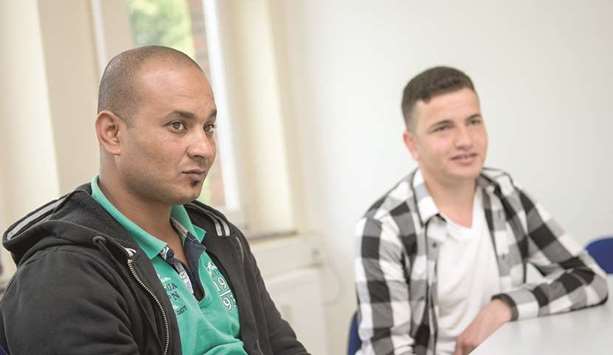Dawed Suleiman is smoking and relaxing with the others during his lunch break at the LEB language school in Hanover. The 35-year-old Iraqi has been in Germany three years now. In his home city of Sinjar, he was a carpenter.
Asked what he wishes for the most, the answer is one word: “Work.” But his German is not good enough, and for this reason a job remains a remote prospect.
He is enrolled on a language course, but it will take him eight months – or some 600 hours – to reach “B1” proficiency, the minimum standard required by most employers.
According to statistics from the Institute for Job and Professional Research (IAB), only about one in 10 work-eligible refugees have found a job within one year of arriving in Germany. The long-term outlook, though, is better. After five years, the figure rises to 50 per cent, and after ten years, 60 per cent. Learning German takes time.
In another room at the LEB centre, Nooshin Meghdadzadh types a Farsi word into a translation app on her smartphone. The 46-year-old is feeling hopeful, having landed a practical internship at a beauty salon. In Iran, she worked as a cosmetician. These days, she shares a nearby apartment with her sister and daughter.
Sitting next to her is Gholam Zekeira Haseri, who is living alone in Germany. Over the previous 19 months, the 31-year-old has spent time in the cities of Hamburg, Borkum and Bramsche. He’s recently received word that he can stay in Germany for three years.
“I like to cook,” he says softly. In Afghanistan he worked as a car mechanic. He misses his wife, who is still there, and hopes she may soon be able to join him.
All refugees who are granted a residency permit in Germany must take a course on integration. They can also participate in a programme called “Take off for Future” at the country’s employment centres, which offers help determining which kind of employment might be most suitable for them.
Everyday life means overcoming other obstacles besides language skills. “It is very difficult to find an apartment,” says Mohamed Barkel, a Syrian refugee. Together with a cousin, he is trying to find a flat. But it requires a lot of paperwork – and a lot of money. Since last year, around 200 refugees have undergone the six-month orientation phase at the LEB centre, says Michael Juech, project head. But he estimates that only about 40 per cent of the refugees can properly read and write in their own language, which makes teaching them a new language difficult.
“The language barrier is a tall one,” Juech says. And the IAB adds that a good 70 per cent of the refugees lack certified job qualifications from their home countries.
One such person is Al Moussa Mousa, who arrived from Syria two years ago. He would like to be a paramedic. During his flight from Syria, he helped a woman in Lebanon who was caring for the sick. “I really enjoyed it,” the 21-year-old said. But he admits that he did not attend school very much in Syria.
By contrast, there are those with higher educational degrees. One is Ronio Ibrahim, 25, who studied Arab literature in Aleppo. His English is very good and he can communicate well in German. As to his future prospects, Ibrahim would love to study – perhaps acting – or to find work in film production.
One issue, however, is getting foreign educational qualifications accepted in Germany, notes Suna Baris, who is manager of integration studies in the city of Hameln, where many entire refugee families are living.
“There are enough study places in the language courses, but often the people have little opportunity in their everyday lives to speak German,” says Baris, a German national whose own parents arrived a generation ago as guest workers from Turkey.
Those who integrate the fastest are families with small children who attend day-care centres and quickly make contact with other families. “This is where it really goes well,” Baris says. - DPA

Abdelkader Mohamed, from Egypt, and Mohamed Barkel, from Syria, are both enrolled on programmes at the LEB centre in Hanover, which helps prepare refugees for the German job market.


